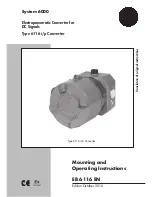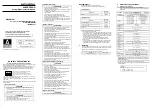
1
1-357
The following parts are supplied as accessories with each outdoor unit.
Check that all accessory parts are present before installing the outdoor unit.
ACCESSORIES SUPPLIED WITH OUTDOOR UNIT
Air Intake
Strong wind
Intake side
Wall / Standing outer wall
Strong wind
Selecting the location for installation and service.
10. Ensure to assign several people or use a mechanical lift, etc. to transport the unit.
SELECT THE OUTDOOR UNIT INSTALLATION LOCATION
1. Install the unit once you have checked that the installation location matches the following conditions.
A location with sufficient ventilation.
Possibly a location that is sheltered from rain or direct sunlight and is well-ventilated so that hot and cool air
does not build up.
A location where the area around the discharge is not exposed to animals or plants which could adversely
affect the release of hot or cool air from the unit.
A location where the discharge and operation noise will not be a nuisance to the neighbours.
A location that can support the product’s weight or vibrations and secured for horizontal installation wherever
possible.
A location where there is no danger of flammable or corrosive gas leaks.
A location that provides space for installation and service.
A location that allows the pipe and cable length fixture for internal and external connections.
It may need two or more people to carry out the installation work.
Part name
Q’ty Diagram
Application
Part name
Q’ty Diagram
Application
For protecting
electrical wires
Protective
bushing
Banding strap
2
4
For tying electrical
wires together
Installation
Instructions
This manual
2.
Refer to the diagram below for the installation location which is exposed to strong wind.
If a strong wind of more than 5 m/s blows to the area directly in front of the discharge, the outdoor unit’s air
flow is reduced and the outflow may re-enter (short circuit) causing the following outcome: “Reduced capacity”,
“Increased frost formation during heating” or “Operation stopped due to increased pressure”.
Should an exceptionally strong wind blow to the area directly in front of the discharge of the outdoor unit;
there is the risk of damage due to the fan’s high-speed reverse rotation.
If the direction of the prevailing wind is known when operating the unit, place the unit at an appropriate angle
to the wind’s direction so that the discharge faces towards a building or a wall.
3.
4.
5.
6.
7.
8.
9.
If installing at locations prone to snowfall, install the unit as high as possible with suitable roofing which shelters
the unit from snow.
Avoid installing the unit in locations where there are petroleum products (such as machine oil), saline content
(such as coastal areas), sulphurous gas and where high frequency noise is generated.
Place the indoor and outdoor unit, power cords and indoor/outdoor unit connection cables at a minimum distance
of 1 meter or more away from televisions and radios. This is to avoid interference to picture and/or sound.
(However, depending on the electromagnetic waves, noise interference may still occur even with the 1 meter
separation.)
For restaurants and kitchens, avoid installing at locations which draws oil and steam. Plastic parts can
deteriorate from droplets of oil and steam or it can cause falling parts or water leakage.
Avoid installing at the location where cutting oil mist or iron powder is present.
If there is an immense voltage fluctuation due to the location’s problem, ensure
to split the power supply.
When installing the product in a place where it will be affected by typhoon or
strong wind such as wind blowing between buildings, including the rooftop of
a building and a place where there is no building in surroundings, fix the
product with an overturn prevention wire, etc.
Warning
Be careful when picking up and moving the indoor and outdoor units. Get a partner to help, and bend your knees when
lifting to reduce strain on your back. Sharp edges or thin aluminum fins on the air conditioner can
cut your
fingers.
A location that does not obstruct the air discharge or intake.
Air Intake
Strong wind
Strong wind
U-60PE1E5 ~ U-140PE1E5, U-71PE1E8 ~ U-140PE1E8
U-100PEY1E5, U-125PEY1E5, U-100PEY1E8, U-125PEY1E8, U-140PEY1E8
SM830211-07̲PAC-i.indb 357
SM830211-07̲PAC-i.indb 357
2013/09/17 22:48:12
2013/09/17 22:48:12
Summary of Contents for U-100PEY1E5
Page 536: ... MEMO 1 526 ...
Page 540: ... MEMO 2 4 ...
Page 549: ...3 9 3 3 1 Indoor Units Ducted Type S 36PN1E5 S 45PN1E5 S 50PN1E5 Electric Wiring Diagram ...
Page 551: ...3 11 3 3 2 Outdoor Units Single phase U 50PE1E5 ...
Page 552: ...3 12 3 3 2 Outdoor Units Single phase U 50PE1E5 ...
Page 553: ...3 13 3 3 2 Outdoor Units Single phase U 60PE1E5 U 71PE1E5 䡵 ...
Page 554: ...3 14 3 3 2 Outdoor Units Single phase U 100PE1E5 U 125PE1E5 U 140PE1E5 䡵 ...
Page 555: ...3 15 3 3 2 Outdoor Units Single phase U 60PEY1E5 U 71PEY1E5 ...
Page 556: ...3 16 3 3 2 Outdoor Units Single phase U 60PEY1E5 U 71PEY1E5 ...
Page 558: ...3 18 3 3 2 Outdoor Units 3 phase U 71PE1E8 ...
Page 559: ...3 19 3 3 2 Outdoor Units 3 phase U 100PEY1E8 U 125PEY1E8 ...
Page 560: ...3 20 3 3 2 Outdoor Units 3 phase U 100PE1E8 U 125PE1E8 U 140PE1E8 U 140PEY1E8 ...
Page 594: ...4 34 4 HIC PCB A746895 U 60PE1E5 U 71PE1E5 CN VDC U P V W N CN VDC 4WAY Valve CN 20S ...
Page 595: ...4 35 4 HIC PCB continued A746846 U 100PE1E5 CN VDC U V W CN VDC 4WAY Valve CN 20S P NU ...
Page 597: ...4 37 4 HIC PCB A746846 U 100PEY1E5 CN VDC U V W CN VDC 4WAY Valve CN 20S P NU ...
Page 598: ...4 38 4 HIC PCB continued A746847 U 125PEY1E5 CN VDC U V W CN VDC 4WAY Valve CN 20S P NU ...
Page 602: ...4 42 4 HIC PCB A747248 U 100PEY1E8 U 125PEY1E8 CN VDC U V W CN VDC 4WAY Valve CN 20S P NU ...
Page 738: ... MEMO 8 34 ...
Page 739: ...201309 ...
















































